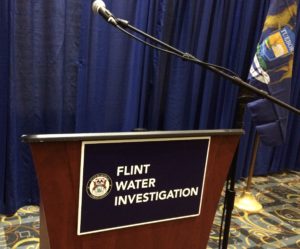Flint Mayor Karen Weaver said there is another indictment in today’s charges filed by the Michigan Attorney General Bill Schuette of the last two state-appointed emergency managers in the embattled city: an indictment against the whole emergency manager system.
“I’m so happy about what is happening right now,” Weaver said into a scrum of microphones after the press conference at which Darnell Earley and Jerry Ambrose, both emergency managers during the events that led up to the water crisis, were indicted on four counts each of what are called “false pretenses,” conspiracy to commit false pretenses, misconduct in office and willful neglect of duty in office. The combination of charges — felonies and misdemeanors — could land each of the two, both appointees of Gov. Rick Snyder, in prison for up to 20 years.
“This is a big step — we’ve been waiting for these things to happen,” she added, when asked what could be done to restore the community’s trust. “People will know we haven’t been forgotten. If you don’t get the people that have done these things to Flint, how can you rebuild trust?:
“Those were the names we were waiting to hear,” she said. ” [T he AG’s office] said they [Earley and Ambrose] played mayor roles in what happened here. I think it’s going to go higher,” she said. “Everybody knew, but nobody spoke up.”
he AG’s office] said they [Earley and Ambrose] played mayor roles in what happened here. I think it’s going to go higher,” she said. “Everybody knew, but nobody spoke up.”
And she made a special point about the emergency manager system, against which she had fought vociferously during her 2015 campaign for mayor and in the year since.
“The emergency manager system has taken the voice of the people and taken our democracy,” she said. “You see what happens.”
Since Gov. Snyder was elected in 2011, seven cities or school districts have been declared financial emergencies and placed under appointed management — and before him, Gov. Jennifer M. Granholm, a Democrat, placed five cities or school districts under emergency managers.
The emergency manager option has existed in Michigan since 1990, when Public Act 72 was passed under Democratic Governor James Blanchard. According to Michigan State economist Eric Scorsone in a February, 2016 interview with Michigan Radio, it was based on the notion that local government is a branch of state government, so solving some local problems could be seen as the state’s responsibility.
The law received little attention for 20 years, until the Snyder era, when he signed into law Public Act 4, which some called a “beefed up”version of Public Act 72. That law was deeply unpopular, and was rejected by referendum in 2012.
But then within a month it was replaced by Public Act 436, which altered several aspects of the rejected act, including a hotly protested provision that the public could not repeal it.
Indicted along with Earley and Ambrose were two former city of Flint officials: Howard Croft, director of the Department of Public Works from December 2011 to November 2015 during the height of the events that led to the disaster, and Daugherty Johnson, former utilities director for the Department of Public Works. All four have been charged with combinations of felonies and misdemeanors that could land them in prison for up to 20 years.
During the water crisis, 12 people died from Legionnaires disease and thousands of Flint residents, many of them children and vulnerable adults, were poisoned by lead in the water. Flint residents still are drinking only filtered or bottled water while testing, some pipe replacement, and pipe treatment with phosphate coatings continue.
EVM Editor Jan Worth-Nelson can be reached at janworth1118@gmail.com.


You must be logged in to post a comment.